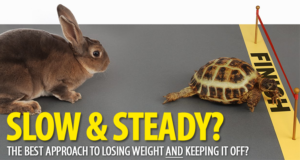How Fast Should You Lose Weight?
Once a person decides it’s time to lose weight, it’s almost inevitable they will try to shed unwanted pounds as quickly as possible. We’ve seen this played out on prime time TV in The Biggest Loser. This reality show turned weight loss into a contest to see which obese contestant could lose the most weight in 30 weeks. In the beginning weeks of the contest, most lost between 10 to 30 pounds a week.
 What appeared to be a huge success in the beginning, turned out to be a long-term disaster for the hopeful contestants. In 2016 The National Institute of Health published the results of a long-term study that documented the weight gain and loss of contestants in season 8, which aired in 2009. The study found most of the contestants regained their weight, and in some cases, gained more than before they entered the contest. Their metabolisms slowed to the point that some were burning 600 to 800 fewer calories a day than the average person their size. Researchers were most shocked that as the years progressed and the numbers on the scales climbed, the contestants’ metabolisms did not recover. It was as if their bodies were intensifying their efforts to pull them back to their original weight. This seems to suggest the difficulty with losing weight and keeping it off long term is more a matter of biology than will power.
What appeared to be a huge success in the beginning, turned out to be a long-term disaster for the hopeful contestants. In 2016 The National Institute of Health published the results of a long-term study that documented the weight gain and loss of contestants in season 8, which aired in 2009. The study found most of the contestants regained their weight, and in some cases, gained more than before they entered the contest. Their metabolisms slowed to the point that some were burning 600 to 800 fewer calories a day than the average person their size. Researchers were most shocked that as the years progressed and the numbers on the scales climbed, the contestants’ metabolisms did not recover. It was as if their bodies were intensifying their efforts to pull them back to their original weight. This seems to suggest the difficulty with losing weight and keeping it off long term is more a matter of biology than will power.
Many popular diet programs promote they can help people lose a considerable amount of weight in just 21 days. Beachbody has a 21 Day Fix that will allow you to lose up to 15 pounds in 21 days! Shark Tank investors just bought into a Keto Diet Pill that will allow you to lose 30 pounds of belly fat (like you can tell your metabolism from where to burn the fat) in 21 days! Dr. Oz recently came up with a 21 Day Weight Loss Diet that will help you “feel and look great in just one month.”
While all of this sounds great, the long-term effect of these short-term approaches is almost always tragic. The first thing to understand about any diet is that a diet is pretty much “die” with a “t’ on the end. The word diet comes from a Latin word that means “a way of life.” It’s not something you do for 21 days. It’s something you commit to. It’s easy to lose 15 to 30 pounds in 21 days. Just about anyone can achieve that by starving themselves and working out excessively. The problem? Most of us will live a lot longer than 21 days. Therefore at the end of your quick diet, your body will revolt, There will be no more diet, and you’ll probably crave and eat all the crap you were eating before starting this nonsense.
The reality is people who successfully complete weight loss programs gain two-thirds of their weight back in the first year, and 95 percent of people who lose weight gain all of their weight back within five years. No diet is successful unless you can keep your weight off for more than 2 years. So, if your goal is to lose weight, start by making simple changes to your eating habits that you can continue the rest of your life.
 How quickly can you safely lose weight and keep it off? According to the American College of Sports Medicine, safe and effective weight loss should occur at a rate of 1 to 2 pounds a week. This will allow you to lose 52 to 104 pounds in a year. That sounds good, right? The problem is that as far as I can tell, there’s no scientific evidence for this recommendation. More importantly, will losing 1 to 2 pounds a week lower your metabolism, making it difficult to keep the weight off?
How quickly can you safely lose weight and keep it off? According to the American College of Sports Medicine, safe and effective weight loss should occur at a rate of 1 to 2 pounds a week. This will allow you to lose 52 to 104 pounds in a year. That sounds good, right? The problem is that as far as I can tell, there’s no scientific evidence for this recommendation. More importantly, will losing 1 to 2 pounds a week lower your metabolism, making it difficult to keep the weight off?
According to an article in Physiology & Behavior, the average person can safely lose a half a pound a week without slowing down their metabolism. More obese people can safely lose weight a little quicker in the beginning, but if they want to keep weight off long term, their progress will eventually need to slow down. If you want to drop pounds and keep them off for good, plan on losing no more than 26 to 52 pounds in a year.
While that may sound really slow, even if you take the most conservative approach, you will be 26 pounds lighter at the end of a year. And chances are, the 30 pounds you’re trying to lose has been the result of 10 to 20 years of bad eating habits. Give yourself more than three months to turn those habits around. Remember, people who lose weight gain two-thirds of it back within a year.
 The best approach to weight loss is to make a few simple changes you can live with for the rest of your life. That’s why our Simple 9 program works so well. It’s not a diet, it’s a lifestyle change that will allow you to gradually lose weight and keep it off long term.
The best approach to weight loss is to make a few simple changes you can live with for the rest of your life. That’s why our Simple 9 program works so well. It’s not a diet, it’s a lifestyle change that will allow you to gradually lose weight and keep it off long term.
You should never start any weight loss program you can’t stick with for the rest of your life. If you’re a client at Exercise Inc, and you want to lose weight, ask your coach today about helping you with The Simple 9.
If you’re not a client, schedule a consultation today. Our Simple 9 program is included in your 20 Minutes A Week.

